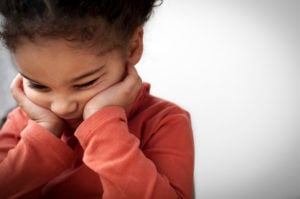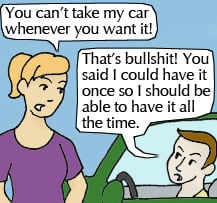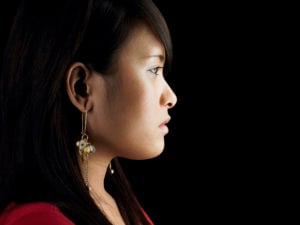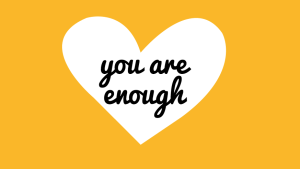
An unhappy child holding their head in their hands.
I made a terrible mistake this past week. I assured my kids that Hillary would win. Then, Tuesday night, I sent them to bed with the promise that I would wake them when she did.
Instead, of course, like so many other parents, Wednesday morning, I had to share the grim news that the election had not gone that way.
But before I got a chance to do that, I received a text from my daughter’s best friend. A ten-year-old fifth grade girl of color, who wrote at 6AM, “Oh my god, can you believe that Donald Trump won?”
Since my daughter doesn’t have a phone, it came to me. So I texted back, “This is her mom. She’s still sleeping. I’ll have her text you when she is up. I am very upset myself, but remember, there are still lots of good people in the world! We still live in a democracy, and we will fight hatred. You are loved.”
She sent me back a frowny face emoticon.
I sent her back a heart.
Then my daughter woke up, and continued the text chain saying, “It is so sad,” before moving on to a discussion about which episode of The Flash the girls were on.
And that’s the thing: Kids will be sad. And scared. And confused. And rightly so. But they will also still be children who should be encouraged to watch their TV shows, and text their friends, and send emoticons to express how they feel.
Particularly with younger kids, we need to remember that there’s a difference between how we’re all processing what on earth just happened, and how we will turn around and talk to our kids about it.
We can let them share their fears, and soothe them, but we also need to understand that this should not be theirs alone to carry. They should not have to bear the burden of this day as adults do.
While we shouldn’t hide our responses to the election, we need to think about what impact these responses will have on our children. Indeed, children are far better equipped to manage parental sadness than parental fear. If at all possible, we need to channel our fear and grief into action that we can use as a model for our children.
But, of course, we as parents still have the dark task of helping our kids understand – right now – just how someone they have learned from us is a bigot, a misogynist, a xenophobe, and a dangerous threat to all we hold dear, has assumed this most powerful of positions.
We can start by hearing their concerns. Are they afraid of being deported? Are they afraid of walls, of violence, of war? Do they worry that that their parents marriages will no longer be recognized? Ot that down the line they will not be allowed to marry the person that they love? “Will Trump hurt people?” I heard one pre-teen ask.
And we can address these very real concerns as best we can.
We can tell them that we still live in a democracy. That we will hope that this man will be surrounded by individuals more competent than he. We can assure them that we have already lived under systems that we have long opposed, that many of us have experienced the rule of a president who we did not support, and that this event, while brutal, is part of a larger history in a country where injustice has often reared its head, but where so too has goodness and love.
History, we must remind ourselves and our children, is not only written in four-year bursts.
I will share with my own children what my father, a historian, reminded me today – that Trump will soon discover that he cannot really expel ten million people from the United States, or make Mexico pay for a wall. That he will enjoy the pageantry of being president, but will be bored by the actual work and will leave all that to his subordinates, as Reagan did.
That his handlers will try to coach him not to say offensive things, but from time to time, his nasty temperament will, of course, become apparent. That his own supporters will end up hating him, because they will realize that he never really meant what he said. That it will be awful, but perhaps not as bad as it would be if he really believed in anything.
Cold comfort, maybe. But comforting nonetheless.
And comfort is key when we talk to children. But we must assure them that while today and tomorrow, and maybe for many days hence, we will shed tears, when our shock ebbs, then we will act.
We can explain that we will continue to write and create. We will continue to advocate for what we believe in. We will march and protest and rally.
We can explain that this is not easy. That we understand how disenfranchised they might feel. How powerless it is to be subject to the outcome of a vote in which they could not participate.
That we get that, while Tuesday, it might have seemed like we were moving forward, the foreseeable future will be more of a struggle just to hold on to what we’ve got.
We can tell them we know that so much of what we are up against is systemic, and that we’re not going to be able to just usher in a hopeful new way of being unless we proactively tear down these systems we’re up against.
But while we must acknowledge this, we can also share that we as grown-ups are committed to doing that hard work of dismantling structures which we fear will now be even more deeply entrenched.
And once we do this, then we can begin to rebuild.
If our children benefit from privilege, we will remind them that they have a duty to work even harder for their friends and family who do not derive the benefits that they do. We can not let our sadness obscure the fact that we have power and that we have a duty to use that power for good.
And if we are feeling personally threatened, we need to reach out for support. We need to take comfort in the fact that we are not alone, that well over half this country is with us. With you.
Indeed, we can hold our own feelings about what has happened, while also letting our children be children and empowering them to know that they can be part of making a difference either now or in the future. Because that is a future they need to feel still offers promise. Our children should not feel the weight of this loss the way we do. They need to hear that there is still hope.
We can liberate our children with our vision for the next generation. “I wanted it to be my generation,” we can tell them. “But now, I can work towards making sure it is yours who makes this change.”
And while this might seem a far distant dream, to deprive them of the sense that this is possible is to deprive them of any chance of optimism about what lies ahead.
Nevertheless, if we tell them this, then we must charge ourselves with actually doing the work needed to help ensure that this will actually be the case.
This is a dark, dark time. But we need to hold our children close. We need to let them be children. We need to empower them. And we need to take a deep breath, regroup, and show them with our actions that we are continuing the crucial activism work that has never been more important than it is right now.
[do_widget id=’text-101′]
Ellen Friedrichs is a Contributing Writer for Everyday Feminism. She’s a health educator, sometimes writer, and mom. She has worked at Manhattan’s Museum of Sex, developed sex education curricula in Mumbai, India, and run HIV prevention programs for at-risk teens in the South Bronx. Currently, Ellen runs a middle and high school health education program and teaches human sexuality at Brooklyn College. More of Ellen’s writing can be found here. Follow her on Twitter @ellenkatef.
Search our 3000+ articles!
Read our articles about:
Our online racial justice training
Used by hundreds of universities, non-profits, and businesses.
Click to learn more
Most Read Articles
- « Previous
- 1
- …
- 30
- 31
- 32




















